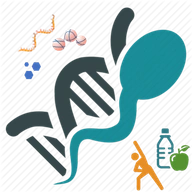Diet and Exercise Modulate the Sperm Epigenome in Men
This project will test our hypotheses that overweight and inactive lifestyle result in epimutations in the sperm epigenome relative to the normal epigenetic programming in lean and active men and that diet and exercise modulation leads to reversal of these epimutations resulting in both a healthier “phenotype” and “epigenotype” which may persist after stopping the interventions.

Mechanism Underlying the Transduction of Epimutations from the Soma to the Male Germline
This project aims to address one fundamental question remains unanswered: given that the effects of exposures, either environmental or dietary, are presumably initially manifested as epigenetic changes in directly exposed somatic cells (e.g. pancreatic islet cells, adipocytes, hepatocytes, etc.), how do the phenotype-specific epimutations in somatic cells get transduced into spermatozoa? Data to be obtained will help fill the knowledge gap in our understanding of the molecular mechanisms underlying the intergenerational epigenetic inheritance of paternally acquired traits in general.
Germline-mediated Transgenerational Epigenetic Inheritance of Paternal Epimutations Induced by a High Fat Diet
It is focused on investigating mechanisms underlying the sequential series of events that includes transmission of epimutations from the HFD/-Ex F0 sperm to F1 fetus to F1 immature pup to F1 adult to induction of epigenetic disease in F1 offspring. With its overall comprehensive scope, as well as its potential to very productively integrate with Projects 1 & 2, Project 3 will represent an in-depth study, the comprehensive nature of which is unparalleled in the field.

